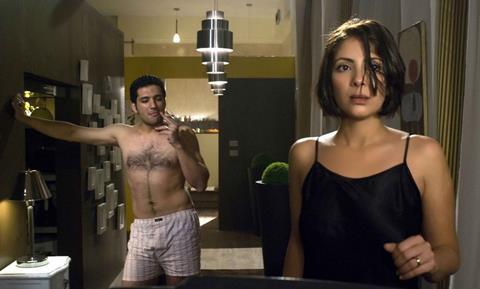Dir. Yousry Nasrallah. Egypt, 2009. 135 min.

A box office and critical hit at home in Egypt, Scheherazade Tell Me A Story is a scathing criticism of male chauvinism in that country which pulls no punches and leaves no doubts about Yousry Nasrallah’s intentions.
Reverting once again to the live broadcast formula of Aquarium, he uses a fictional late night TV show, From Dusk to Dawn, and its fearless moderator Hebba (Mona Zakki) to convey several female tales of woe, drawing particularly unpleasant portraits of the Egyptian male in the process.
Festivals may be interested in Scheherazade for its political undertones, while Mediterranean minorities all over Europe will probably turn it into a rewarding box office experience
Also attacking the endemic corruption that dictates Egypt’s fate at the highest levels, Nasrallah’s blunt statements may lack the subtlety of similar Western satires, but the effect they have had at home indicates he may have chosen the right approach. Better known for a more complex cinematic language, he has decided this time to adapt a more commercial Egyptian style, with scriptwriter Waheed Hamed’s characters an open book from the minute they appear in front of the camera. Festivals may be interested in Scheherazade for its political undertones, while Mediterranean minorities all over Europe will probably turn it into a rewarding box office experience regardless of the critical verdict.
Hamed’s script initially focuses on newly married Hebba, the highly successful TV presenter of a show whose tendency to tackle sensitive political issues rubs the country’s leaders the wrong way. Her husband Karim (El Raddad), meanwhile, is an ambitious journalist happy to ingratiate himself with any political figure who can advance his career. Told that his wife’s show may hurt his chances, he tries to steer her away from politics into personal stories, only to realise that ultimately everything is political.
Hebba’s guests on the show include handsome, older Amany (Badr), a manic-depressive spinster who has refused to make emotional compromises despite overbearing pressure. Safaa (El Gamal) is a gentle soul who has spent 15 years in jail for killing a man who cheated on her and her sisters. And Nahed (Akroud) is a rich heiress swept off her feet into misguided marriage by a slimy economist. All their stories reflect the political climate of the country.
In between these live interviews, each one dramatised into an independent melodrama, the plot returns to Hebba’s own marital issues, which erupt into violence when Karim does not get his much-desired promotion and decides that his wife’s scandalous show is to blame.
Although the plot points are clearly signposted – and often executed for convenience - in this type of picture it is not what happens that matters as much as how it happens. In this respect Nasrallah offers full value for money – in scenes including Amany denouncing her pompous suitor in public, Safaa’s explosive rage or Karim venting his frustration on Hebba.
Also, quite surprisingly, if there are any objects of desire in this film, they are male rather than female – which throws an unexpected light on sexual relations in Egypt. Out of the large cast, Sawsan Badr’s Amany and Sanaa Akroud’s Nahed are closest to their roles but Mona Zakki’s TV star displays an insouciance that is often hard to accept. Technical credits are definitely praiseworthy, though tighter editing might have helped smooth out some rough edges.
Production Company
Misr Cinema
Producer
Kamel Abou Ali
International Sales
Pyramide International
+33 1 42 96 02 20
Screenplay
Waheed Hamed
Cinematography
Samir Bahsan
Production design
Mohamed Atteya
Editor
Mona Rabi
Music
Tamer Karawan
Main Cast
Mona Zakki
Mahmoud Hemeida
Hassan El Raddad
Sawsan Badr
Rihab El Gamal
Nahed El Sebai
Nesrin Amin
Mohamed Ramadan
Sanaa Akroud
Hussein El Imam















![[L-R]: Amanda Villavieja, Laia Casanovas, Yasmina Praderas](https://d1nslcd7m2225b.cloudfront.net/Pictures/274x183/6/4/1/1471641_pxl_20251224_103354743_618426_crop.jpg)





